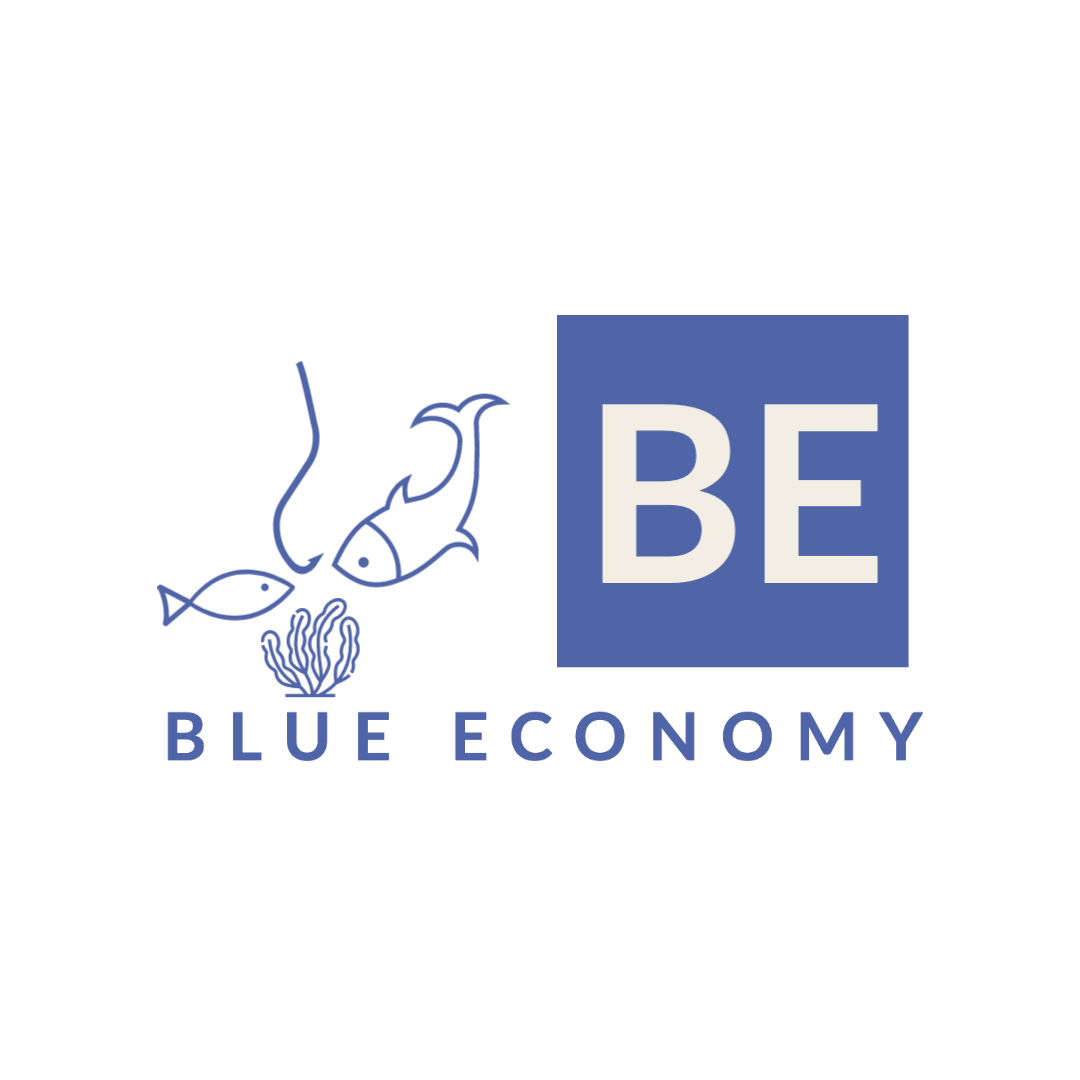By Joel Onyango
In Kenya's coastal regions, women play a vital role in their communities, particularly in sectors such as fishing, small-scale agriculture, and tourism. However, they often face numerous challenges that limit their economic opportunities and hinder their ability to fully participate in local development. In recent years, there has been a growing recognition of the importance of inclusive business models, which are deliberate interventions that sustainably integrate low-income and marginalized individuals or groups into the value chains of core business activities in a community with a view to improving their economic livelihoods.
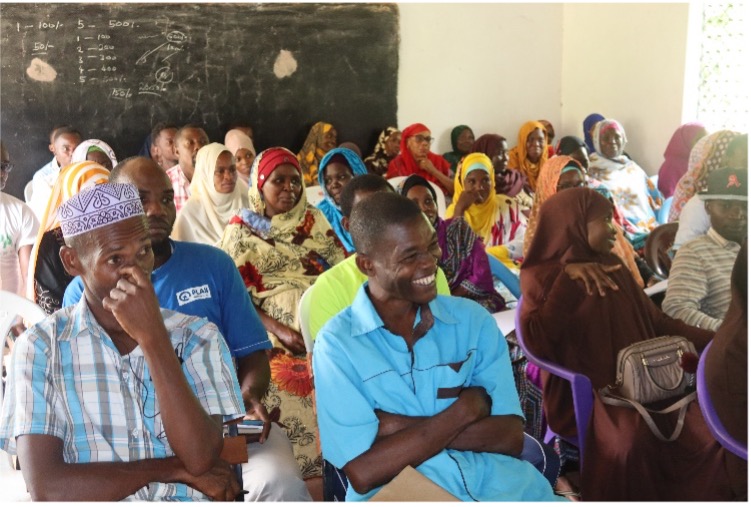
Members of various community groups during the Business Models Training (BMT), Kwale County under the Blue Empowerment Project.
In this context, this approach aims to empower and uplift coastal women communities. These models not only enable economic growth but also promote social inclusion and gender equality. This blog post explores the significance of inclusive business models and showcases some inspiring examples from Kenya's coastal regions.
- Access to Financial Services: One of the major barriers faced by coastal women communities is the lack of access to financial services. Inclusive business models aim to address this by providing financial literacy training, microcredit facilities, and savings programs tailored to the specific needs of women. By enhancing their financial capabilities, these models enable women to start and expand their own businesses, invest in their communities, and improve their livelihoods.
- Sustainable Fishing and Aquaculture: Fishing is a crucial industry in coastal communities, but women's participation in this sector is often overlooked. Inclusive business models are promoting sustainable fishing practices and empowering women fisherfolk by providing them with training, modern equipment, and market linkages. These models not only ensure the preservation of marine resources but also enable women to earn a fair income and enhance their social standing within their communities.
- Women-led Cooperatives: Small-scale agriculture is another key economic activity in coastal regions. Inclusive business models support women-led agricultural cooperatives, providing them with training on sustainable farming practices, access to markets, and value-added processing techniques. These models enhance the productivity and profitability of women's agricultural activities, while also fostering collaboration, knowledge sharing, and collective decision-making among the community.
- Tourism and Handicrafts: The coastal regions of Kenya are renowned for their stunning beaches, diverse cultural heritage, and vibrant handicrafts. Inclusive business models in tourism and handicraft sectors focus on empowering women by offering training in hospitality, customer service, and product development. These models create opportunities for women to establish their own guesthouses, tour guiding services, or craft enterprises, enabling them to generate income and showcase their cultural heritage to tourists.
- Capacity Building and Entrepreneurship: Inclusive business models prioritize capacity building and entrepreneurship training for coastal women. By equipping them with skills in business management, marketing, and digital literacy, these models enable women to seize economic opportunities and overcome gender-based barriers. Additionally, mentorship programs and networking opportunities foster an environment of support and mentorship, empowering women to thrive as successful entrepreneurs.
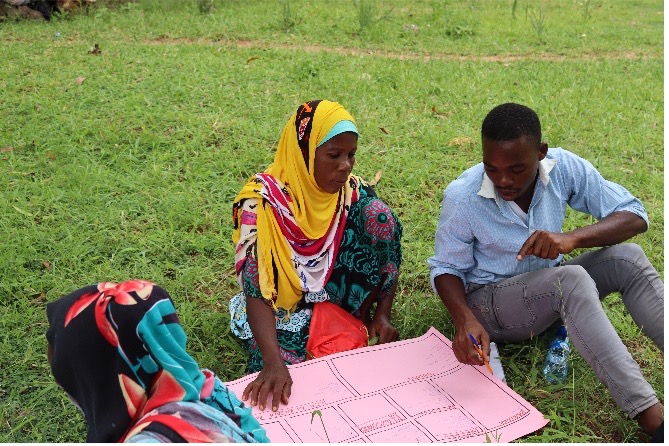
Participants reflect on their businesses using the 10 - Step Business Model Canvas during the Training of Community Groups on Business Models.
Inclusive business models have the potential to transform the lives of coastal women communities in Kenya by creating economic opportunities, promoting gender equality, and fostering sustainable development. Through access to financial services, sustainable fishing and agriculture practices, women-led cooperatives, and entrepreneurship training, these models empower women to become active participants in their local economies. As we move forward, it is crucial to continue supporting and expanding these inclusive business models, ensuring that coastal women have the tools and resources they need to thrive and lead prosperous, resilient communities along Kenya's beautiful coastline.
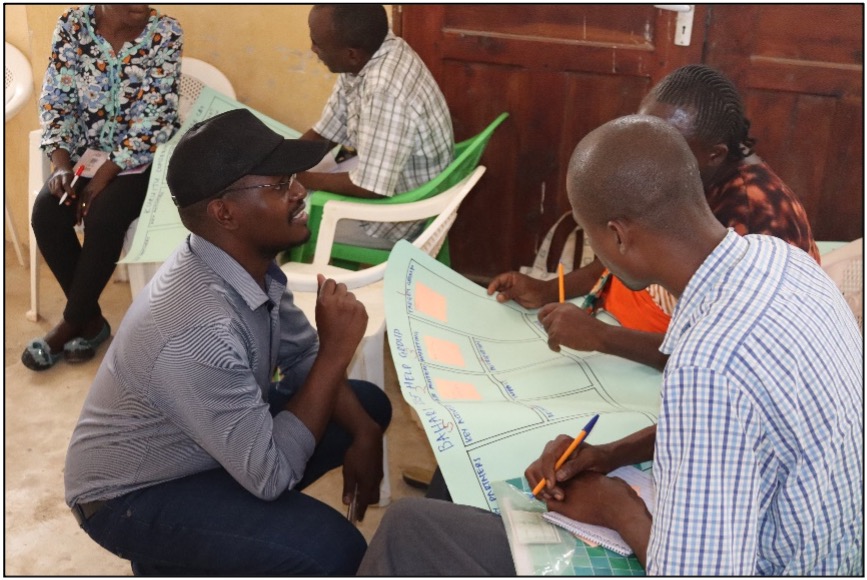
African Centre for Technology Studies (ACTS) Climate Resilient Economies Programme Lead and Blue Empowerment Project, PI Dr. Joel Onyango discusses the 10 - Step Business Model Canvas with Community Groups in Kilifi County during the Business Models Training.
As part of the blue empowerment project, we aim to support the initiative to empower the coastal women communities by enhancing capacity for entrepreneurship among coastal women in Kenya through a comprehensive approach that addresses their unique challenges and builds upon their strengths.
- Firstly, the project is providing targeted training programs that focus on business management, financial literacy, marketing, and digital skills. These programs have been tailored to the specific needs and cultural context of the women, ensuring accessibility and relevance.
- Secondly, the project recognizes that mentorship and networking opportunities can play a crucial role in supporting and guiding aspiring entrepreneurs. As such the project is establishing mentorship programs – in collaboration with other partners, where experienced businesswomen and men, can share their knowledge, provide advice, and inspire others which is instrumental in building confidence and fostering entrepreneurial success.
- Additionally, the project will be creating a networking platform that connect coastal women with potential customers, suppliers, and collaborators to facilitate valuable business relationships.
- With partnerships, the project has leveraged access to financial resources, such as grants specifically designed for women entrepreneurs, to alleviate the barriers they face in accessing startup capital.
- Lastly, the project is facilitating collaboration and partnerships within local (sub-county) business units and promoting women's participation in relevant industry associations and networks, to support women-led business thrive and access new opportunities for growth and market expansion.
By combining these elements, the project aims to enhance the capacity for entrepreneurship among coastal women, enabling them to create sustainable businesses and contribute to the economic development of their communities. The project continues seeking partnerships that would accelerate the positive impact realized so far in Kwale, and Kilifi counties in Kenya, and we invite you to be part of the transformation.
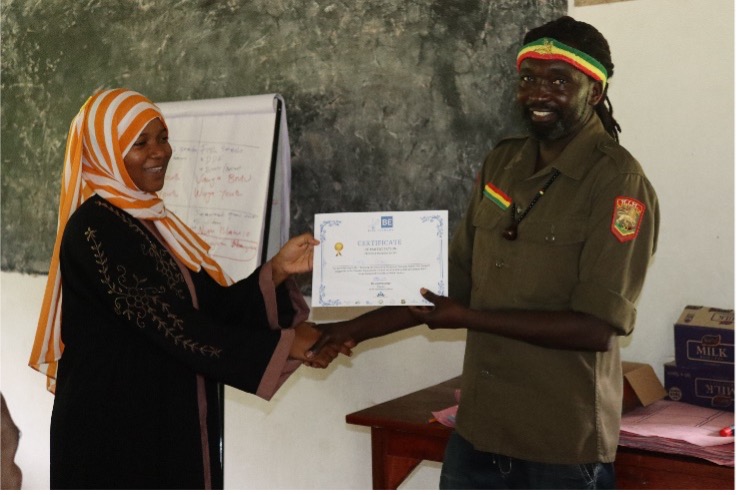
Kenya Industrial Research and Development Institute (KIRDI) Senior Research Scientist, Dr. Linus Kosambo presents a certificate to a community group member upon successful completion of the Business Models Training (BMT), Kwale County.
